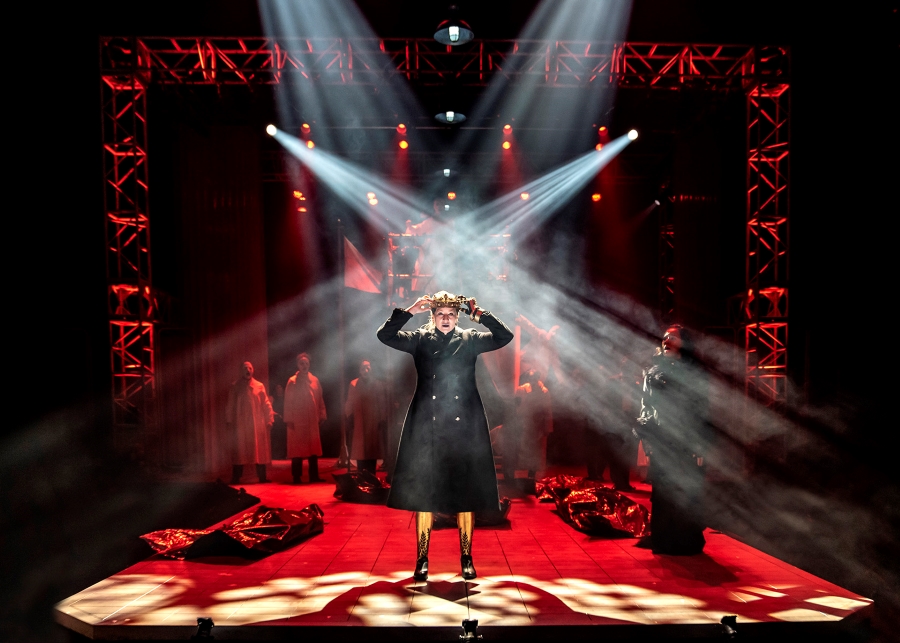“Growing up, I never saw anybody that looked like me doing anything like I’m doing,” said Tony-nominated actor and Paralympic sprinter Katy Sullivan. “I had absolutely nothing to point to to say that a career in theatre and acting and television and any of that stuff was even remotely possible.”
Now Sullivan is taking the Chicago Shakespeare Theater stage as Shakespeare’s most well-known disabled character in a brutal new production of Richard III directed by Chicago Shakes’s new artistic director, Edward Hall. The production is credited as being the first major production of the play in the United States to feature a woman with a disability in the title role, a role that Hall said feels “in every respect like it was written specifically for her.” In their production, running through March 3, Sullivan, Hall, and the Chicago Shakes team sought to utilize the specific talents and lived experiences that Sullivan brings to the table to create a production that even has Hall, a veteran Shakespeare director, seeing the play anew.
Thinking back, Hall called it a “happy accident” that this production with Sullivan became his first as artistic director of Chicago Shakes. They were working together on the U.K. premiere of Martyna Majok’s Cost of Living, starring Sullivan and Adrian Lester, back in 2019 when Hall thought to himself that he found someone he knew would make a perfect Richard. He recalled that, though he hadn’t seen Sullivan perform Shakespeare before, he saw in her an actor capable of being the chameleon that he sees in the character of Richard.
“Richard is almost a vaudevillian,” Hall said, “who is funny, witty, surprising, but who also feels great pain in his heart about the world in which he’s being forced to move.”
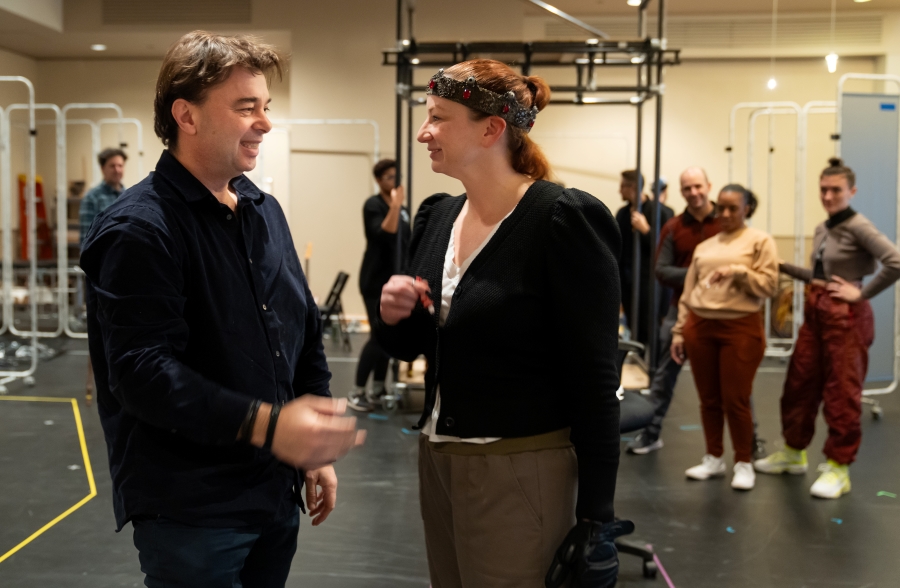
He called up then-artistic director Barbara Gaines to pitch the idea of a Sullivan-led Richard III, and plans were in motion when the pandemic hit. Years later, the show now serves as a striking re-introduction for a director previously seen at Chicago Shakes 20 years ago at the helm of the Rose Rage trilogy, a bloody reworking of Shakespeare’s Henry VI trilogy that went on to be produced in New York after its Chicago run and included a 75-minute dinner break. His Richard III seems no less brutal—it’s easy to lose track of the number of body bags that wind up onstage, and the smell of a revved-up chainsaw takes us into intermission—but it’s all in service of the vicious lead performance by Sullivan.
“Katy is laying her body on the line with this in every respect,” Hall said when he, Sullivan, and I spoke last month. “She’s taking such great risks, and it’s opening my eyes to the play completely differently.”
Sullivan said she’d had over a year of prep work heading into this role. Building on Hall’s idea of Richard as a sort of chameleon, Sullivan explained that she sees him as someone who is constantly acting, who is analyzing who is in the room with him and deciding how he needs to act so that he can get what he wants.
“We discussed early on how we can not only do that through action, but through physicality and through my body specifically,” Sullivan said. “This show is so specific to my body and how I get around and how I move.”
Sullivan added that the physically difficult show is able to explore the specific stage pictures that she, a double amputee, can create with her body. It’s evident throughout the first section of the play, as Richard starts out on the ground; without prosthetics, Sullivan delivers his opening monologue, gesturing to her legs as Richard describes himself as “half-formed.” This Richard then spends most of the first act in a wheelchair, from which Sullivan may prop herself up to gain height either to deliver a playful aside to the audience, or to gain a bit of stature to impose on someone Richard is threatening. In another moment, Sullivan drops to the ground from her wheelchair as Richard lowers himself to tell Lady Anne to kill him. The mental changeability that Hall has always seen in the character now has a physical correlative in Sullivan, with Sullivan’s physicality able to naturally embody the ambition and goals of Richard.
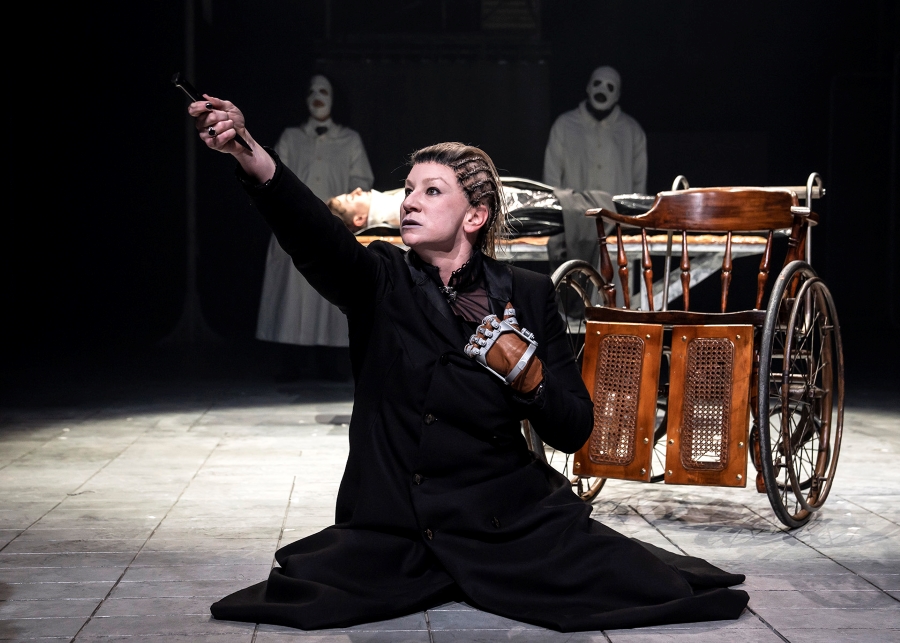
“There were so many accounts that I read and books and things of actors who had played this role, and so much of their thought process was the disability and was the physicality,” Sullivan said. “They became obsessed with that being the thing. I think what this has afforded us is an opportunity to look at this from the lens of somebody who already has all that life experience behind them. I don’t have to go searching for it. I walk into the room with all of that life experience.”
Sullivan also noted that there were moments during the rehearsal process where they’d discuss how specific language aimed at Richard would affect her differently. Hall’s direction certainly doesn’t shy away from how vile characters in the play can be toward Richard: At one point King Edward IV spins Richard in his wheelchair without his consent. At another, King Edward’s sons, played here by actors using puppets, viciously mock Richard by flopping to the floor to pull themselves around on their arms. Despite being a steely warrior, Hall said, these are slights that Richard could never quite shake off.
“However he moves through the world, he’s worked out how to be very effective on the battlefield,” Hall said, a point underscored in the show by Richard killing someone with just one hand. “Despite all that, people keep pointing at him, calling him the devil.”
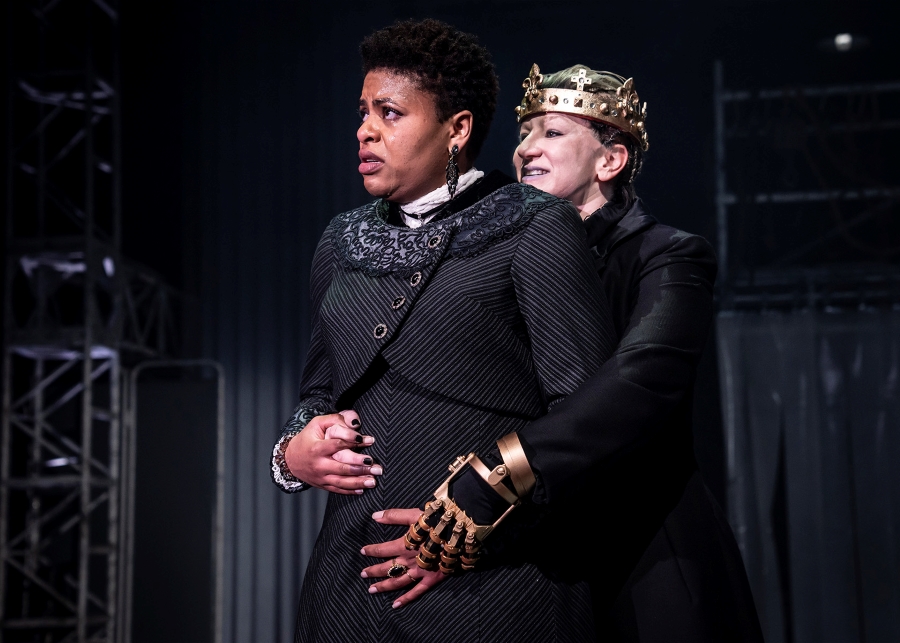
Indeed, Hall and Sullivan found it interesting to parse Shakespeare’s text not only to clock the moments where Richard reacts to his physicality being put in the spotlight, but also to see the numerous times where Richard seems just fine being called a liar or murderer. All of this work comes to fruition as you see Sullivan utilize changes in the way Richard is being perceived against those around him.
For instance, Hall pointed to Richard wooing Lady Anne. Richard thinks that if he can woo her, “she must think I’m a marvelous proper man.” From that moment, he calls for tailors to start dressing him like that proper man. In the production, that leads to Sullivan’s Richard using wooden-looking prosthetics for the first time in the show, sacrificing a bit of her mobility—Sullivan had previously been flying around the stage, both in her wheelchair and scrambling across the ground—for the sake of blending in.
Then, in the second act, though still wearing the prosthetics, Richard returns to his wheelchair as part of his ploy to convince the people that he should be king. As Richard ascends to the throne, Sullivan swaps out wood for sleek gold prosthetics adorned with black leaves. Sullivan dons new prosthetics one more time as Richard prepares for war—but I don’t want to spoil it. Suffice it to say, it’s another shift in physicality that, to borrow Hall’s words, “I think I can safely say you won’t have seen onstage before,” and one that is unique to Sullivan’s performance.
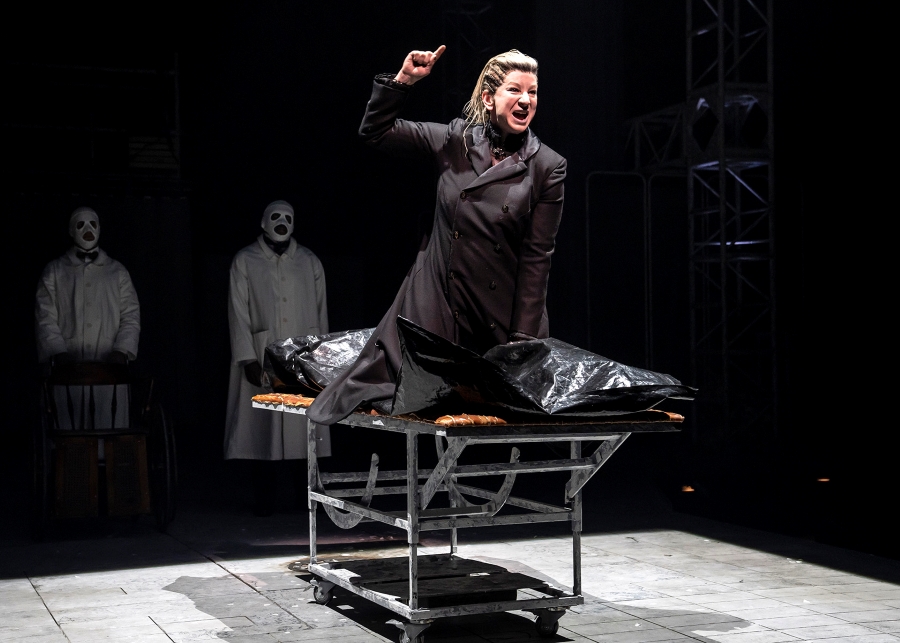
“One of the things we talked about really early on is that I want him to feel dangerous and strong,” Sullivan said. “I think able-bodied people playing this role can fall into this trap of making him so disabled that it’s this huge thing to overcome. And I’m like: No, he killed a king. He is a warrior and he’s strong and he’s powerful, and we should be scared of him. It’s the people that underestimate him that ultimately end up paying the price.”
Hall called Richard a “charming villain,” along the lines of Iago. Indeed, the fun of Sullivan’s snarky, sarcastic asides almost make you want to join in on Richard’s devious fun—until you see the heads of two children in a jar. He’s a character who forces audiences to question our empathy, and the empathy we afford—or don’t—to those with different life experiences.
It was interesting, Sullivan explained, to think about what disability meant back when Richard III was written compared to today—the idea being that people would look at a disabled person and assign moral fault or blame to that person or their family, imagining it must be some kind of punishment. From a contemporary standpoint, Sullivan said, Richard’s disability is simply the hand he was dealt, and if people want to think him a worse person because of it, he’s going to play with those expectations. For this production—a telling of Richard III that manages to use Sullivan’s unique abilities while never losing sight of a story about deadly ambition—Sullivan said she has just one hope.
“I hope that people leave the theatre with a little bit of a different idea,” she said, “about what it means to live your life from this perspective.”
Jerald Raymond Pierce (he/him) is the Chicago editor for American Theatre. jpierce@tcg.org

